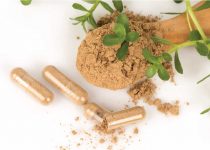Skincare the Ayurveda Way: A Holistic Approach to Radiant Skin
Skin is our largest organ. We often work a lot around keeping our health optimum but our skincare takes a backseat. Especially during aging, our skin starts losing moisture and elasticity resulting in wrinkles and lines.
Commercial skincare products are mass-produced with harmful chemicals that can damage your skin rather than repair it. The Ayurvedic approach to skincare is rooted in the use of natural herbs, oils, and daily routines tailored to your unique skin type.
Ayurveda skin care is categorized into different skin types. Plus, many herbs in Ayurveda are available as Ayurvedic supplements to keep the skin glowing from the inside.
Read on to learn how to care for your skin, the best herbs and Ayurvedic supplements for glowing skin, and how to slow down skin aging using Ayurvedic practices.
Understanding Skin Types as Per Ayurveda
Ayurveda categorizes skin types based on the tri-doshas: Vata, Pitta, and Kapha. Every individual’s body composition is defined by their dominant dosas. Each dosha represents different elements and energies that govern bodily functions, including the skin.
Vata is associated with the elements of air and space. Individuals with dominant Vata have typically dry, thin skin prone to roughness and flakiness. It can become dehydrated easily and is sensitive to environmental factors like wind and cold weather.
Pitta is governed by fire and water elements. Pitta-dominant people are generally fair, sensitive, and prone to redness, inflammation, and conditions like acne and rosacea. Their skin tends to have a warm, slightly oily complexion but can be reactive to heat and harsh products.
Kapha, associated with earth and water, results in thick, oily, skin that is more resistant to the signs of aging. However, Kapha-dominant individuals are prone to enlarged pores, blackheads, and excessive oily skin.
According to the Ayurvedic approach to skincare, understanding your skin type can determine the best skincare routine and treatments to maintain healthy, balanced skin.
Ayurvedic Skincare Routine
Ayurveda emphasizes the importance of a consistent daily routine, or “dinacharya,” tailored to your skin type. To take better care of your skin, create a personalized routine for skincare that should include:
Daily Skincare Routine
Follow a routine of cleansing the face with mild Ayurvedic cleanser and warm water, followed by exfoliation, rejuvenation, and repair. Having a skincare routine helps get rid of dead skin and external impurities and keeps the skin healthy.
Hydrate and moiturize
Skin needs hydration both internally and externally. Keep yourself hydrated with lots of water, coconut water, or herbal teas. Practice self-massage with essential oils daily for 5-10 minutes to keep your skin soft and supple.
Physical Excercise
Every day physical activity boosts blood circulation. It has overall health benefits but works wonders on the skin as well. Improved blood circulation helps get rid of body toxins through precipitation and keeps the skin healthy.
Adequate Sleep
No matter how much you invest in skincare, but if you are not adequately rested, every ayurvedic approach to skincare is wasted. Sleep deficit can cause puffy eyes, dark circles, fast aging, and inflammation. Make sure you sleep at least 8 hours for better skin.
Best Herbs and Ayurvedic Supplements for Skin Care
Ayurveda is rich in herbs that offer incredible benefits for the skin. These herbs can be used in various forms, such as powders, oils, or infusions, to enhance your skincare routine.
Turmeric (Haridra)
Turmeric is a powerful anti-inflammatory and antioxidant herb. Turmeric powder has been used as a spice, in health drinks and skincare for centuries. It helps brighten the skin, reducing blemishes, and combating acne.
It can be used in various forms to combat skin issues. You can apply Herbal Hills Turmeric powder with honey or milk for a glowing complexion or Jiva Ayurveda turmeric cream for a clear composition.
Neem (Nimba)
Neem is renowned for its antibacterial and antifungal properties, making it excellent for treating acne and other skin infections and keeping the skin radiant. Neem oil or powder can be applied directly to the skin to soothe irritation and purify the complexion.
Or you can consume Axiom or Kapiva Neem Juice to purify the skin from the inside. Neem is especially beneficial for people with oily and sensitive, Pitta-type skin. Regular use of Neem Juice can prevent skin problems like blackheads, pigmentation, dullness, and aging.
Aloe Vera (Kumari)
Aloe vera is incredibly soothing and hydrating. It’s particularly beneficial for Pitta skin, helping to cool and calm redness and inflammation. You can use fresh aloe vera gel as a moisturizer or face mask.
Krishna’s Aloe vera gel works as a photo blocker to protect the skin from harmful UV rays. It is scientifically proven to reduce blackheads, pimples, and dark circles, and nourishes the skin all day long. It also prevents aging and gives a natural glow to the skin.
Ashwagandha
Ashwagandha is a time-tested herb known for its multiple uses. One of the most versatile herbs, it’s a boon for skincare as it naturally stops aging. It can provide hydration to the skin and increase the production of collagen naturally to keep up the skin’s elasticity and reduce the occurrence of wrinkles and fine lines.
Organic ashwagandha capsules from Vedickaroots and Dr Vaidya’s Ashwgandha capsules with everyday skincare and yoga can boost skin quality.
Manjistha
Manjistha is a powerful blood purifier and promotes clear, radiant skin. It helps detoxify the skin, reducing the appearance of blemishes and dark spots. Himalaya Wellness Manjishtha Tablets help detoxify skin, reduce tanning, and hyperpigmentation, and improve the overall appearance.
Slow-down Skin Aging with Ayurveda
Aging is a natural process, but with the Ayurvedic approach to skin care, you can slow down the signs and maintain youthful, healthy skin. When we use cosmetics, we are not providing nourishment but harming our skin.
The chemically laden skincare creams and beauty products increase dryness and strip off the good bacteria. They even strip our skin of natural oils responsible for maintaining skin moisture and elasticity.
Moreover, with environmental pollution, our skin absorbs so many pollutants which makes it duller and damaged and prone to faster aging. To prevent harm to the skin, we need to take the natural route towards skincare.
Massaging natural oils like sesame, coconut, or almond oil instead of chemical moisturizers nourishes the skin, improves circulation, and keeps it supple and hydrated.
Using herbal face masks, and natural cleansers regularly can rejuvenate the skin and reduce the appearance of fine lines and wrinkles. Masks made with ingredients like sandalwood, turmeric, and fuller’s earth (Multani mitti) help to firm the skin and restore its natural glow. Herbal cleansers and toners like honey, milk, rose water, etc keep the skin in better health.
Additionally indulging in daily exercise, drinking plenty of water, and herbal teas, and eating a balanced diet is equally important for healthy skin. Herbal teas like tulsi or green teas keep the skin hydrated and flush out toxins.
Proper hydration and nutrition are essential for maintaining elasticity and preventing dryness, which can lead to premature aging. Also, incorporating ayurvedic supplements to increase collagen production, detoxification and restoration of skin can slow down skin aging.
Conclusion
Ayurvedic skincare is a time-tested approach that emphasizes balance, natural ingredients, and consistency. By understanding your skin type and incorporating Ayurvedic practices into your daily routine, you can achieve radiant, healthy skin that reflects your inner well-being. Whether it’s through personalized routines, the use of potent herbs, or anti-aging practices, Ayurveda offers a comprehensive path to skincare that’s both effective and gentle on the body. Embrace the wisdom of Ayurveda and let your skin shine with natural beauty!



